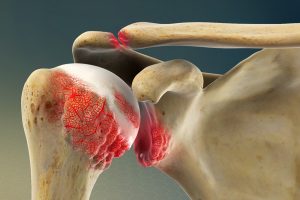 Shoulder arthritis can be a debilitating condition, causing chronic pain and limiting your mobility. Fortunately, there are several strategies you can implement to effectively manage shoulder arthritis and alleviate discomfort. In this comprehensive guide, we will explore five essential tips that can help you cope with the effects of shoulder arthritis and improve your quality of life.
Shoulder arthritis can be a debilitating condition, causing chronic pain and limiting your mobility. Fortunately, there are several strategies you can implement to effectively manage shoulder arthritis and alleviate discomfort. In this comprehensive guide, we will explore five essential tips that can help you cope with the effects of shoulder arthritis and improve your quality of life.
Understanding Shoulder Arthritis
What is Shoulder Arthritis?
Shoulder arthritis is a condition characterized by the inflammation and degeneration of the shoulder joint. It can result from various factors, including osteoarthritis, rheumatoid arthritis, avascular necrosis, and post-traumatic arthritis. The most common form of shoulder arthritis is osteoarthritis, which occurs due to wear and tear of the joint over time.
Symptoms of Shoulder Arthritis
The symptoms of shoulder arthritis can vary from person to person but often include:
-
- Persistent shoulder pain, especially during movement
- Stiffness and limited range of motion in the shoulder joint
- Swelling and tenderness around the shoulder area
- Difficulty performing daily activities that involve shoulder movement
Use Appropriate Pain Management Strategies
Consult with Your Doctor
When dealing with shoulder arthritis pain, it is crucial to consult with your doctor or healthcare provider. They can assess your condition, provide an accurate diagnosis, and recommend suitable pain management strategies. It is essential to follow their guidance and avoid self-medicating or using unapproved remedies.
Utilize Painkillers and Topical Creams
Appropriate painkillers and topical creams can provide relief from shoulder arthritis pain. Consult with your doctor to determine the most suitable medications for your condition. Nonsteroidal anti-inflammatory drugs (NSAIDs) are commonly prescribed to reduce pain and inflammation. Additionally, topical creams, such as those containing capsaicin or menthol, can be applied directly to the affected area for localized pain relief.
Explore Alternative Therapies
In addition to medication, alternative therapies can also help manage shoulder arthritis pain. These may include physical therapy, acupuncture, massage, and transcutaneous electrical nerve stimulation (TENS). These treatments aim to reduce pain, improve flexibility, and enhance overall shoulder function. Consult with your healthcare provider to determine which alternative therapies may be beneficial for your specific condition.
Incorporate Shoulder Exercises and Stretches
Work with a Physical Therapist
Engaging in gentle shoulder exercises and stretches can significantly alleviate the pain associated with shoulder arthritis. Working with a physical therapist or a qualified healthcare professional is highly recommended to ensure that you are performing the appropriate exercises for your condition. They can create a tailored exercise program that focuses on strengthening the muscles surrounding the shoulder joint and improving its range of motion.
Shoulder Circles
One effective exercise for shoulder arthritis is shoulder circles. This exercise involves gently moving your shoulders in a circular motion to stretch the muscles and promote flexibility. Start by standing or sitting upright and slowly rotate your shoulders forward in a circular motion. Repeat this movement for a few sets, then switch to rotating your shoulders backward.
Arm Raises
Arm raises are another beneficial exercise for shoulder arthritis. To perform this exercise, begin by standing or sitting upright with your arms resting at your sides. Slowly raise both arms simultaneously, lifting them above your head. This movement helps stretch the shoulder muscles and improves their range of motion. Repeat this exercise for several repetitions, gradually increasing the number as your shoulder strength improves.
Neck Stretches
Neck stretches can also provide relief for shoulder arthritis pain. Gently stretching the neck muscles can alleviate any tension or pain radiating from the shoulder area. To perform neck stretches, sit or stand upright and slowly tilt your head to one side, bringing your ear closer to your shoulder. Hold this position for a few seconds, then repeat on the opposite side. Perform several repetitions of this stretch to promote relaxation and reduce shoulder discomfort.
Minimize Shoulder Strain
Avoid Overexertion
To reduce pain and prevent further damage to your shoulder joint, it is essential to minimize shoulder strain. Avoid activities that require repetitive or excessive shoulder movement, such as heavy lifting or participating in contact sports. Pay attention to your body’s signals and take breaks when needed to prevent overexertion.
Maintain Good Posture
Maintaining proper posture can significantly alleviate shoulder arthritis pain. Be conscious of your posture when sitting, standing, and performing daily tasks. Keep your back straight, shoulders relaxed, and neck aligned with your spine. Avoid slouching or hunching forward, as this can place unnecessary strain on your shoulder joints.
Take Regular Breaks
If you have a sedentary lifestyle or spend extended periods in one position, such as sitting at a desk, make a conscious effort to take regular breaks. Stand up, stretch, and move around to prevent stiffness and reduce shoulder strain. Incorporating short breaks into your routine can help maintain joint mobility and alleviate discomfort.
Consult with a Medical Professional
Explore Medical Interventions
In some cases, medical interventions may be necessary to effectively manage shoulder arthritis. Depending on the severity of your condition, your doctor may recommend corticosteroid injections to reduce inflammation and provide pain relief. In more severe cases, surgery, such as shoulder replacement or joint resurfacing, may be considered as a last resort. Consult with your doctor to discuss the potential benefits and risks of these interventions.
Seek Ongoing Support
Living with shoulder arthritis can be challenging, both physically and emotionally. It is essential to seek ongoing support from healthcare professionals, support groups, or online communities. These resources can provide valuable information, guidance, and emotional support to help you navigate the challenges of managing shoulder arthritis.
Managing shoulder arthritis requires a comprehensive approach that combines appropriate pain management strategies, tailored exercises, and lifestyle modifications. By implementing the tips outlined in this guide and working closely with your healthcare provider, you can effectively manage your shoulder arthritis pain and improve your overall quality of life. Remember to consult with your doctor before making any significant changes to your treatment plan or trying new exercises or therapies.
Contact Us (859-331-3100) For More Information or to Request an Appointment
—
 About Tristate Arthritis and Rheumatology
About Tristate Arthritis and Rheumatology
Tristate Arthritis and Rheumatology is the first and largest Rheumatology practice in the Northern Kentucky area. Founded by Dr. Arthur Kunath in 1986, our rheumatology practice now consists of six doctors who are board certified in both Internal Medicine and Rheumatology and a Physician Assistant. Patients see one doctor (except in emergencies), thereby assuring continuity of care and an individualized docteor-patient atmosphere giving the physician the ability to establish personalized and detailed relationships. Our doctors have received numerous awards, including being listed as “Top Doctors” in Cincinnati Magazine, receiving the Patient’s Choice Award, the Most Compassionate Doctor Award, and the American College of Rheumatology’s “My Doc Rocks” award.


